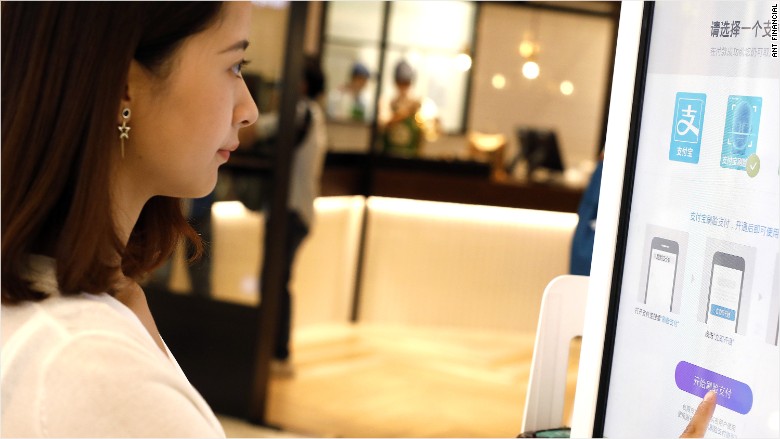Through the magic of machine learning and facial recognition, Chinese restaurant-goers are now able to use Alipay to order and purchase delicious chicken using their face.
What is Alipay?
Job advocates may complain about how computer terminals are slowly replacing human cashiers at places like McDonald’s or Tim Hortons, but this new way of paying is rather unprecedented. In fact, it’s the first restaurant in the world to take payments using facial recognition.
Much like Paypal, Ant Financial, an affiliate of Alibaba, operates a payment platform called Alipay. A feature of this app is that you’re able to sign in with your front-facing camera. Using facial recognition, it can scan the face of the user for identification. Alipay has over half a billion users, and with the convenience of facial recognition sign-in, a hefty percentage of those users will have already uploaded their photos to Alipay’s user database. Because of this, it wasn’t a difficult stretch to extend this technology just a bit further.
KPro, a brand of KFC, began offering payment options using the Alipay mobile app back in 2015, by way of scanning QR codes on the customer’s smartphone. Convenient, sure—but the process still required a live cashier and a user with a smartphone. This latest extension transcends the necessity of both cashier and smartphone, requiring only a computer terminal.
Dubbed “Smile to Pay,” the user first makes menu choices on a large touchscreen panel. When the user is ready to pay, they merely smile for the camera and enter their telephone number for verification. The money is then transferred from their Alipay wallet, and the user enjoys their meal—doubtless more so than those having been troubled with silly things like credit cards or mobile devices.
Nothing New
Really, there’s nothing new about using facial recognition. If this is true everywhere, it’s especially true in China. In 2016 for instance, Chinese company Baidu began using facial recognition for fast and easy admittance into tourist attractions in the historic town of Wuzhen. This was met with praise, as it reduced waiting times for visitors and all around made their stay more enjoyable. But this technology isn’t always used for consumer convenience. The Temple of Heaven Park in Beijing began utilizing facial recognition software to cut down on the theft of public restroom toilet paper but was met with much criticism on account of its rather stringy rationing of the toilet tissue.
Now if, after pondering what kind of people steal toilet paper from these shared facilities, your first thought regards the privacy concerns raised by having cameras in public restrooms, consider this: it could very well be that the majority of facial recognition technology used to determine identity, is done so on the scale of millions of people, completely involuntarily.
At an Oktoberfest beer festival in the Chinese city of Qingdao this past August, police used cameras to capture the faces of over 2,000,000 people, both domestic and foreign. The purpose was to determine the identity of as many people as possible in order both to find wanted suspects, as well as to capture suspicious-looking people—presumably before they could commit a thought crime, if you’ll excuse the sarcasm.
To What End?
I don’t want to be cynical. Technologically, I’m enthralled by the ingenuity that goes into these systems. Large-scale databases of images whittled down to a single person’s identity in fractions of a second by optimized machine learning algorithms on high-performance computers… it’s really quite amazing! But it’s also quite unnerving, and from a privacy point of view, I don’t like it.
I especially don’t like it when I know that organizations like the FBI constantly and surreptitiously gather photographs of innocent individuals for no immediate purpose, only to offer them to local police departments—many of whom have expressed strong interest in real-time facial recognition by connecting CCTV to law enforcement networks. I’m a strong believer of one’s right to privacy, and having a government increasingly able to track me everywhere I go runs pretty contrariwise to my ethical compass.
Every sacrifice of privacy has a cost. The convenience of ordering chicken without a wallet comes at the cost of normalizing facial recognition, without giving thought to the potential ramifications, be they political or otherwise. But at this point, given our place in this technological world, perhaps privacy itself is an illusion.
Facing the Future… With Your Face
The fact of the matter is that I don’t have to like it. Convenience seems to be winning every battle, and services like Alipay, just like PayPal, Apple Pay and Google Wallet, are the future. Canadians, like Americans, tend to be more conservative than the Chinese in their sense of privacy, giving Alipay a market edge over the more dominant players in the West. But don’t be fooled for an instant. That doesn’t mean we don’t have the technology, it just means its usage has been hidden from us and instead is being used by the powers that be.
But if you’ve decided to fully succumb to the idols of convenience, fear not—it’s likely very soon that some analog of these chicken dolling kiosks will be popping up at a restaurant near you. If not from Alipay, it’ll be from some other corporation offering a better, more convenient alternative. Or, if the boss sends you on a business trip to Beijing, feel free to grab some yummy KPro! Don’t worry, just leave your phone and wallet at the hotel.


